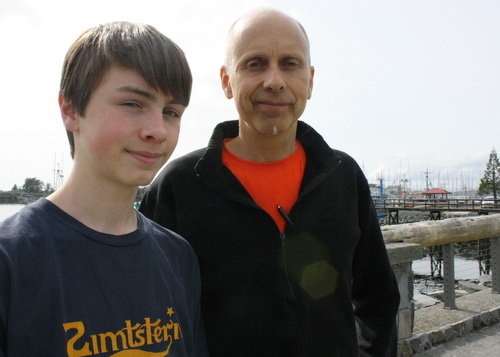
David Wilcox, 14, and his father, Brett, are running across the United States next year. The pair hopes to raise awareness about genetically modified foods, which they say are a danger to the global food supply. (KCAW photo by Ed Ronco)
Note: This story was updated to reflect comment from Monsanto, which was received after our initial deadline.
A Sitka man and his 14-year-old son are hoping to convince you that genetically modified organisms are bad for your health, and for the environment.
Agriculture companies modify the DNA of plants that enter the food supply, to help them grow faster or bigger, or be more resilient to pests. Brett and David Wilcox are channeling their opposition into a demonstration in Sitka this weekend.
The Sitka demonstration is called the “March Against Monsanto.” It coincides with other similar events around the world and is scheduled for 2 p.m. Saturday atop Castle Hill.
But Brett and David Wilcox also hope a big journey next year will help bring attention to their cause.
“We’re going to be running across the country,” says David Wilcox, 14. “We’re starting somewhere in California, and we haven’t really thought of an ending point yet.”
His father, 52-year-old Brett Wilcox, says they’ll include a stop in St. Louis, headquarters to the agribusiness giant Monsanto. The company has become a lightning rod for the debate over genetically modified foods. Among other things, it markets modified seeds to farmers. The seeds are patented and farmers who keep extra seeds for replanting can find themselves taken to court.
That bothers Brett Wilcox, but his bigger worry is about the environmental impact of genetically modified foods. He says his spiritual beliefs are opposed to modified organisms, but also that he has unanswered questions about their scientific safety.
“We’re going to gather seeds from the world, and we’re either going to have them in a backpack and we’re going to carry them as we cross the country, or if we get so many seeds that we put them in a trailer and pull them behind us, we will do that,” Brett Wilcox said. “Those seeds will be the symbol for the run, saying this is why we are running. This is the purpose. We are here to say that we honor these sacred seeds, and we don’t want people messing with them.”
Monsanto is no stranger to the criticisms. The company has an extensive website built entirely to respond to common arguments people make against its practices. One page is titled “Why does Monsanto sue farmers who save seeds?” The company says it’s simply protecting its patents. Another is titled “Farmer suicides in India,” and denies claims that the modified cotton has driven farmers on the subcontinent to kill themselves.
In a written statement, Monsanto spokesman Tom Helscher says the company respects the fact that people can have different points of view, but that the safety of genetically modified crops is well established. The crops undergo federal review by two, sometimes three, federal agencies, including the Food and Drug Administration, the Environmental Protection Agency and the U.S. Department of Agriculture.
“Hundreds of studies in the peer-reviewed scientific literature support the safety of GM crops and there has not been a single substantiated instance of illness or harm associated with their use,” Helscher wrote in an e-mail to KCAW. “The National Academies of Science, the United Nations Food and Agriculture Organization, the World Health Organization and the American Medical Association – among others – have all concluded that GM foods do not pose any more risk to people than other foods.”
The history of agriculture is full of developments in technology — things that have increased the amount of food farmers were able to send to plates. Tractors replaced horses. Fertilizers boosted crops. But Brett Wilcox says what Monsanto and other companies are doing is different.
“What they are producing is not meant to feed the growing population,” he says. “It’s meant to feed cars and cattle. Very little of the research is designed to do anything that would provide any sort of enhanced nutrition. It’s all designed to give them a patent — a legal hold on seeds — so that farmers are then brought into a modern-day slavery system.”
Brett Wilcox says farmers have become too beholden to Monsanto. So, he and David are preparing for their run.
“David has done two half marathons and he’s going to do another half this summer,” he said. “He’ll do his first full marathon this summer for Sitka’s inaugural full marathon. We’re excited about that coming up on August 3rd.”
Brett Wilcox also runs marathons, although he didn’t come to running until his 40s.
“I kind of grew up with the belief that I didn’t have the heart to run,” he said. “That’s not true. I do fine running, and I enjoy it. I’ve done a couple of marathons, and it helps keep me relatively sane.”
The two Wilcoxes plan to leave on their journey sometime in January. They estimate it will take about eight months.































